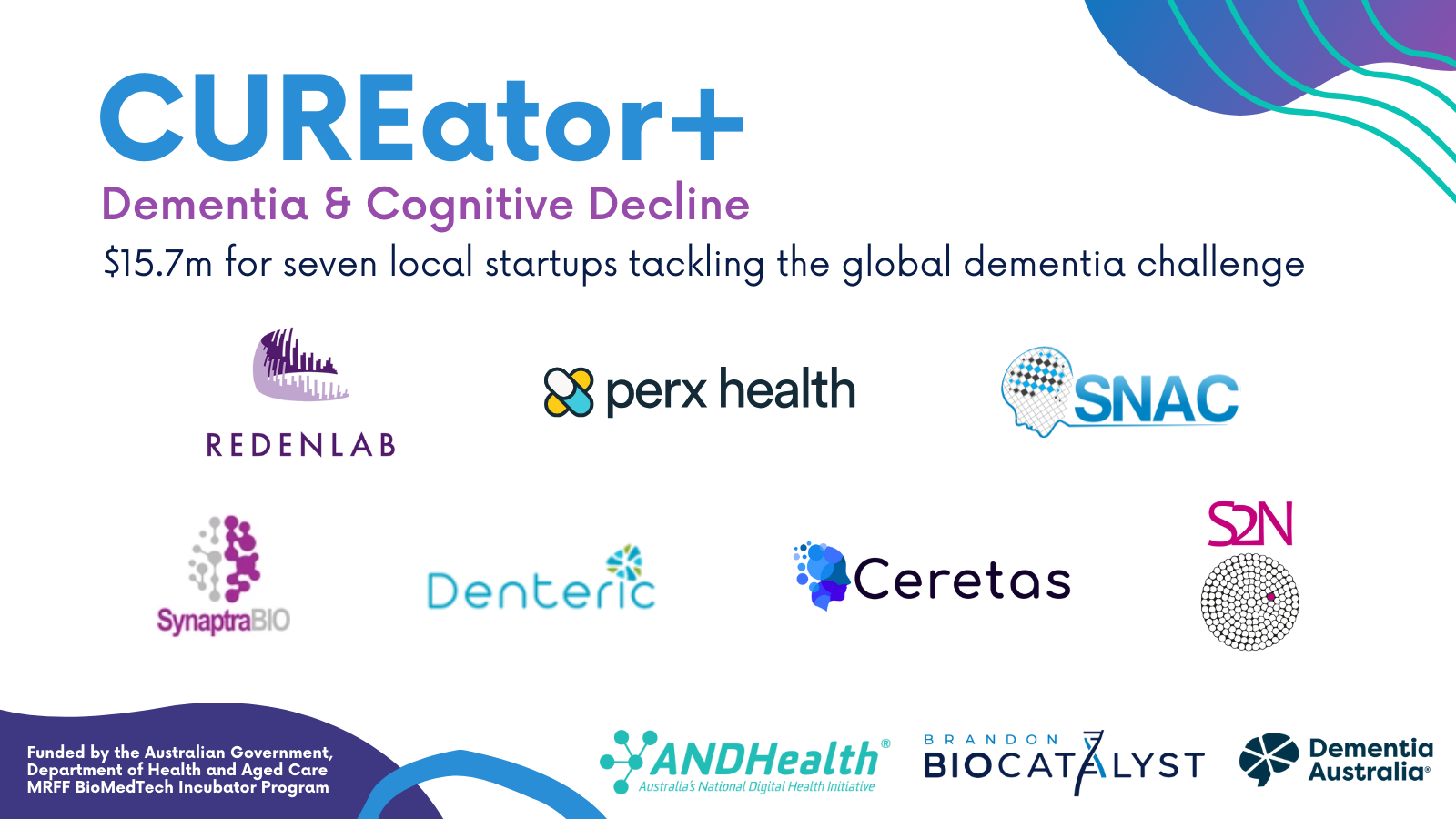With funding from the Australian Federal government’s Department of Health, Disability and Aged Care and the Medical Research Future Fund, CUREator+ supports the development and commercialisation of medical innovations focused on improving the lives of people impacted by dementia and cognitive decline globally.
Awardees were selected through a competitive process that included an assessment of commercial viability by the CUREator+ Investment Review Committee, with living experience feedback provided via Dementia Australia's Community Steering Committee.
“By 2030, over 550,000 Australians will be living with dementia. These companies are at the forefront of Australian innovation, developing therapeutics, medical devices and digital and connected health solutions, which have the potential to profoundly improve the lives of people living with dementia and cognitive decline,” said ANDHealth CEO, Bronwyn Le Grice.
Professor Tanya Buchanan, Dementia Australia CEO, “It is both essential and encouraging to see the voices of people with living experience of dementia being heard as we shape the future of dementia prevention, treatment and care. The quality of the recipients reflect an exciting step forward to reduce the impact of dementia for all Australians.”
Dr Chris Nave, Brandon BioCatalyst Managing Director, “The funding provided by the MRFF is a strategic investment in Australia’s biomedical innovation ecosystem and a clear signal of our national leadership in tackling dementia. The companies selected combine world-class science with commercial potential, positioning Australia to deliver global solutions to one of the most urgent health challenges of our time.”
CUREator+ funding is delivered in tranches based on milestone attainment and includes top-up rounds that enable high-performing awardees to apply for additional funds to ensure resources flow to teams demonstrating both scientific excellence and translational potential.
Beyond funding, awardees gain hands-on commercialisation support, including tailored capability coaching and global network introductions to accelerate their path from breakthrough research to real-world therapies.
- RedenLab will receive $2.5 million to improve the detection and monitoring of cognitive decline in neurodegenerative disease by analysing subtle changes in language, speech and emotion. Using a non-invasive, remote monitoring approach, their clinically informed work aims to develop endpoints to be deployed in health clinics.
- Perx Health will recieve $1.3 million to advance its digital care management program, which improves treatment adherence and health outcomes across all health conditions. The funding will support a 12-month pilot of a tailored dementia support app, developed with the aged care industry, to assist people living with dementia and their carers. The pilot’s real-world data will help secure sustainable funding to expand access to this technology nationwide.
- Sydney Neuroimaging Analysis Centre (SNAC) will receive $2.4 million to advance the development and clinical validation of its brain Magnetic Resonance Imaging (MRI) analysis tools. This funding will accelerate the global adoption and enhancement of SNAC technologies, which improve the monitoring of neurological diseases, including Alzheimer disease and other dementias.
- SynaptraBio will receive $2.3 million to utilise their cutting-edge AI-assisted drug discovery platform and develop their first-in-class, small molecule drug candidate that blocks tau-dependent central disease processes to memory deficits and prevent the loss of brain cells in dementia patients. They will use their CUREator+ funding to support preclinical development and progression towards clinical trial of an orally bioavailable therapeutic for Alzheimer's Disease.
- Denteric will receive $2.5 million to advance the clinical development of their vaccine candidate (GPV381) to treat Porphyromonas gingivalis (P. gingivalis) infection. When seeded in the brain from a gum infection, P. gingivalis and its proteases are hypothesised to play a crucial role in Alzheimer’s Disease (AD) progression in patients with P.gingivalis infection. Denteric will be running a clinical trial in AD patients to establish clinical safety and proof of mechanism to support the further clinical development of their candidate.
- Ceretas will receive $2.4 million to enable delivery of personalised therapeutic ultrasound to enhance connectivity and restore function in brain circuits affected in Alzheimer’s disease (AD). The CUREator+ funding will support device optimisation to improve input costs and usability of the Ceretas device aimed to improve symptoms and slow cognitive decline in an upcoming AD clinical trial.
- Skin2Neuron received $2.4 million to advance the clinical development of their cell therapy to reverse AD by restoring lost neurons and synapses in the brain. The CUREator+ funding will increase manufacturing capability and support the development of a synaptic PET biomarker. This will accelerate clinical trial completion and establish proof of mechanism of their innovative approach.

.svg)

.svg)

.svg)
